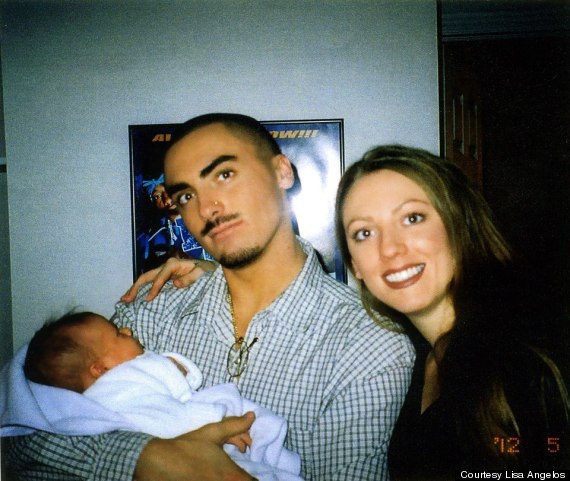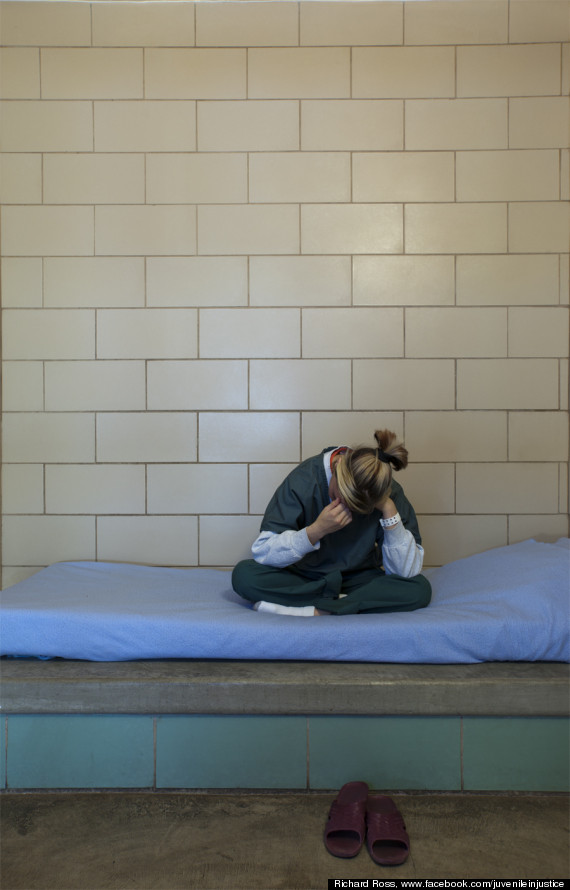Thursday, July 24, 2014
Friday, July 18, 2014
Wednesday, July 16, 2014
Tuesday, July 15, 2014
Monday, July 14, 2014
Sunday, July 13, 2014
Governor Fallin signs criminal justice reform bill
Staff Report
Published: 29-Jun-2014
Published: 29-Jun-2014
OKLAHOMA CITY – Governor Mary Fallin held a ceremonial bill signing for Senate Bill 1278 on Thursday, June 19 in the Blue Room at the Oklahoma State Capitol.
Sen. Kim David, R-Porter and participants of the 31 participants of the Women in Recovery program joined the governor as she signed the bill into law.
S.B. 1278 is legislation that allows the state of Oklahoma to enter into a Pay for Success (PFS) contract to make positive changes in our state without financial risk. SB 1278 uses PFS contracting to enable private donors to provide upfront funding for a diversion program like Women in Recovery, and the state refunds the investment back into the program only if measurable successes are achieved.
The bill helps improve outcomes, such as reduced rates of incarceration, for individuals involved in the criminal justice system. Passage of the bill makes Oklahoma an early adopter of a new financing system for criminal justice reform efforts nationwide.
“Women in Recovery is giving me a chance to change my life for the better,” said Shawna Stice, a current participant of the program. “After six months of being in the program, I’m reunited with my three children and am receiving the support I need to be successful.”
In an interview with CapitolBeatOK, Stice said Women in Recovery “means everything to me now.”
Women in Recovery (WIR) is an alternative to incarceration for nonviolent female offenders that combines strict supervision with a comprehensive day treatment program.
The City Sentinel, CapitolBeatOK.com and Watchdog.org have frequently covered the organization's work.
Enactment of S.B. 1278 is an initial step toward implementation of the Justice Reinvestment Initiative (JRI) championed by former Oklahoma House Speaker Kris Steel, R-Shawnee.
WIR's services include comprehensive case management, supervised visitation with children, job search assistance, substance abuse treatment, employment and vocational training, housing placement, medical services, counseling and life skills training and community integration.
WIR is funded by George Kaiser Family Foundation and operated by Family & Children’s Services in Tulsa.
Note: Pat McGuigan contributed to this report.
American Federation for Children aims to advance school choice in Oklahoma
Patrick B. McGuigan
Published: 11-Jul-2014
Published: 11-Jul-2014
OKLAHOMA CITY – After having helped two school choice candidates to victories in the June 24 primary the American Federation for Children (AFC) has planted its flag in Oklahoma.
Oklahoma City print and broadcasting media titan Russell Perry and Tulsa businessman Bob Sullivan make up the leadership for the recently launched Oklahoma Federation for Children (OFC) leadership.
Perry, owner of several radio stations nationwide and publisher of The Black Chronicle said in a press release, “It is time for the Republican Legislature to catch up with its voters and deliver for the children of Oklahoma.”
Sullivan, Perry’s co-chair, said in the release, “The Republican base wants bolder reforms and more educational choices for Oklahoma’s families.”
The Oklahoma affiliate will have the parent organization’s think tank, lobbying muscle, political action committee and fundraising arm at its disposal, Scott Jensen, senior adviser for AFC.
“We will provide a counter-balance to the clout and sheer power of the education establishment in Oklahoma politics,” Jensen said.
Jensen, once a rising star in the Republican party and the speaker of the Wisconsin Assembly, is involved again in politics after a decade fighting charges he used taxpayer-paid staff members to help him conduct his political campaigns.
He resigned from office in 2006 after a conviction barred him from running again for political office in Wisconsin. He eventually settled on appeal to misdemeanor misconduct charges.
Jensen cut his political teeth as an aide to Gov. Tommy Thompson who championed pioneering school choice measures in the 1990s.
Jensen has never lost passion for the issue.
His organization has come to Oklahoma to change minds in the Legislature, he told Oklahoma Watchdog.
“The number one issue is that not all the Republicans are supportive of choice, and some who are sympathetic are not aggressive in support,” Jensen said. “Those legislators tend to be responsive to the largest interests, the concentrations of power among their constituents. These include school district officials, members of school boards, superintendents and teacher union members.”
To that end, AFC threw its weight behind four primary races, helping win two. Rep. Anastasia Pittman, D-Oklahoma City, will move into the state Senate if she defeats a Republican foe in her heavily Democratic district. Incumbent Republican state Sen. AJ Griffin of Guthrie rebuffed a primary challenger.
Polls in Oklahoma show majority support for educational choice in general and in Oklahoma City and Tulsa, the only jurisdictions in the state where they are presently permitted.
The poll found Republican support for public charter schools was higher in rural areas which presently do not have charters.
“Frankly, some local chambers of commerce are standing in the way of school choice,” Jensen said. “However, the state Chamber is strongly for choice in education.”
Note: The Tarrance Group poll of 600 likely Republican primary voters was conducted June 8-10. Bruce Nienaber of The Tarrance Group, which conducted the survey for AFC, characterized the sample size as “fully representative … based on the latest voter registration figures within the state.” In a memorandum to OFC supporters, Nienaber said the sample “is such that 95 percent of the time results will be within +/- 4.1 percent of the ‘true values’” that would be found if it were possible to interview every likely GOP primary voter.
You may contact Pat: patrick@capitolbeatok.com
Oklahoma ranked as eleventh most corrupt state in analysis of federal data
atrick B. McGuigan
Published: 02-Jul-2014
Published: 02-Jul-2014
OKLAHOMA CITY – Researchers at Indiana University and the University of Hong Kongranked Oklahoma the eleventh most corrupt state in America.
John L. Mikesell, of Indiana, and Cheol Liu of Hong Kong, studied 25,000 convictions of public officials for violations of federal anti-corruption laws nationwide between 1976 and 2008.
Their analysis was posted at the Public Administration Review.
Mississippi topped the most corrupt list, followed by Louisiana, Tennessee, Illinois, Pennsylvania,Alabama, Alaska, South Dakota, Kentucky, and Florida.
Oregon ranked as the least corrupt state, followed by Washington, Minnesota, New Hampshire, Utah, Iowa, Nebraska, Colorado, Vermont, and Wisconsin.
“I don’t think anyone who has studied Oklahoma’s political history and culture will be surprised by this study’s findings, Andrew C. Spiropoulos, director of State Constitutional Law and Government atOklahoma City University, said. “We have suffered from a historically high level of political corruption because of several factors. We are a relatively poor state, with limited economic opportunity in the private sector, making public money and jobs more important.”
The period of the study includes the early 1980s when Oklahoma courts convicted or took guilty pleas in a massive county commissioner scandal.
“We are also a state with a strong populist culture, in which politicians who, legitimately or not, use public power and resources to help out the little guy, Spiropoulos said. “For a century, with few exceptions, we lived under one party rule, which provided few checks on those inclined to feed at the public trough.”
While some state analysts believe things have improved in recent years, former Senate President Pro Temp Mike Morgan, Auditor and Inspector Jeff McMahan, state Sen. Debbe Leftwich, all Democrats, and Republican state Rep. Randy Terrill, have been convicted of bribery since 2008.
"Given recent events in Oklahoma, it appears that parts of this corruption are still with us today," R. Keith Gadde, chairman of the political science department at the University Oklahoma, said in an interview.
State Democratic Party Chairman Wallace Collins told Oklahoma Watchdog increased use of state tax subsidies and tax breaks by Republicans creates a climate of corruption.
State Republican Party Chairman Dave Weston did not respond to a request for comment.
“Electing good people, having government financial transparency laws and internal control systems, and rigorously prosecuting violators can dramatically reduce the level of corruption, but it can’t be totally eliminated,” said Vance Fried, director of the Institute for Free Enterprise and Entrepreneurship at Oklahoma State University in Stillwater.
“As long as you have government officials with the ability to spend a lot of taxpayer’s money, you will have some corruption.”
Mississippi Watchdog has reported the 10 most-corrupt states could have reduced per capita spending by an average of $1,308 if they had merely average corruption levels.
“The study found states in the top 10 tend to focus spending on ‘bribe-generating’ spending and items directly beneficial to public officials such as capital projects, construction, highways, borrowing and total salaries and wages,” the story said.
You may contact Pat: patrick@capitolbeatok.com .
Friday, July 11, 2014
What lawmakers didn't do to end the crisis in our prisons - Oklahoma Policy Institute
http://okpolicy.org/lawmakers-didnt-end-crisis-prisons?utm_source=feedly&utm_reader=feedly

HEART BREAKING! How is this at all necessary or legal this is far out of control. I can't imagine, tears stream my face as I type I myself have a 19 month old. Police Militarization is complete bullshit when did the citizens of the free world country become unjustifyably over policed stripped of their civil liberties and human rights? Burned Babies and the Militarization of American Policing
OMG! Seriously? Can we say OVERKILL? Or is that also illegal? How can anyone even begin to try and justify that many Officers just open fire on an unarmed woman not only killing her who was of real immediate threat to them but there was a baby in the car as well. But what seriously pisses me off is that no charges will be filled in a situation like this where a seeminly harmless unarmed woman can have a firing squad unleash on her yet all these unforgivable criminals that do sick twisted shit to kids or serial killers no one can ever pretend they have a gun and unleash the firing squad on them the people who deserve it! No Charges in Fatal Shooting of Unarmed Single Mother in Washington, D.C.
This is Absolutely Horrifying America is falling apart! Who protects us when our government has gone rouge, what happens when they are basically terrorists? Our Bill of Rights, Civil Liberties, human rights as citizens of America are being violated! Who Polices the Police? 45,000 SWAT Raids Are Terrorizing Families Every Year in the US
Thursday, July 10, 2014
WoW! Heartbreaking...the majority of the population of Earth pop off and run their mouths some constantly I mean seriously to ruin this at the time still just a child not yet a man, this has been entirely blown out of context he will never be the same again. And yet criminals who do actually hurt and harm people repetitively run the streets unpunished
Warning New Social Media Sites-Child Predators Prey like its their Playground
Expert Warns Of Dangers Of New Social Media Website
Hefner Parkway Reopens In NW OKC After Investigation Into Suspicious Bags - News9.com
Hefner Parkway Reopens In NW OKC After Investigation Into Suspicious Bags
Petition | To investigate and change the Oklahoma State Department of Corrections procedures and point system that allows murders to be transferred from Maximum Facilities to a lesser Prison Facility. | Change.org
Wednesday, July 9, 2014
Tuesday, July 8, 2014
Four librarians gagged and threatened with prison time under the Patriot Act - Police State USA
Using the broad powers granted under the USA PATRIOT Act, the FBI demanded that 4 librarians produce private information about library patrons’ reading habits, then used an endless gag order to force them to remain silent about the request for the rest of their lives under penalty of prison time.
WINDSOR, CT -- The FBI demanded that 4 librarians produce private information about patrons' reading habits, gagging them under penalty of prison time.
POLICESTATEUSA.COM
Monday, July 7, 2014
Bridenstine: I couldn't get in to see illegal minors at Fort Sill
by Chris Casteel Modified: July 2, 2014 at 4:20 pm • Published: July 2, 2014

One of several buses believed to be transporting immigrant children arrives Friday at Fort Sill in Lawton. Photo by Paul Hellstern, The Oklahoman PAUL HELLSTERN -
Rep. Jim Bridenstine, R-Tulsa, said he was denied access Tuesday to the Fort Sill facility housing unaccompanied minors who have illegally crossed the U.S. border.
Bridenstine made a visit to the Health and Human Services Department facility at the U.S. Army post in southwestern Oklahoma and was told he couldn’t enter and should email an HHS official to make an appointment. He was told July 21 would be the earliest date he could visit.
Gov. Mary Fallin and Sen. Jim Inhofe, R-Tulsa, visited the facility on June 20.
Bridenstine said, “There is no excuse for denying a federal representative from Oklahoma access to a federal facility in Oklahoma where unaccompanied children are being held.
“Any member of Congress should have the legal authority to visit a federal youth detention facility without waiting three weeks.”
Bridenstine said he visited the base commander and approached the barracks where the children are housed.
” A new fence has been erected by HHS, completely surrounding the barracks and covered with material to totally obscure the view,” he said. “Every gate is chained closed.
“I approached a security guard and asked to speak with the manager of the facility. The guard called his supervisor who said no visitors were allowed. I asked if they were aware that I am a Member of Congress. Eventually the manager came out and said that I would have to go through HHS legislative affairs and that the first chance to visit would be July 21st.
“What are they trying to hide? Do they not want the children to speak with Members of Congress? As a Navy pilot, I have been involved in operations countering illicit human trafficking. I would like to know to whom these children are being released.”
UPDATE:
A statement issued Wednesday by the Administration for Children and Families at the Health and Human Services Department says:
“We have been facilitating tours of our temporary shelters at Joint Base San Antonio-Lackland, Naval Base Ventura County-Port Hueneme and Fort Sill as frequently as possible without disrupting our ability to properly care for the children as part of this humanitarian situation.
“In addition to four media tours, HHS has provided five tours for approximately 55 local, state and federal elected officials who had requested the opportunity to observe the facilities, meet the staff and interact with the children.
“We will continue to schedule these tours of temporary shelters on a regular basis with any officials who request them.”
Alex Weintz, a spokesman for Fallin, said Wednesday that the governor’s visit on June 20 followed an invitation from the Health and Human Services Department.
“However, the governor has the same concerns about transparency that Congressman Bridenstine has,” Weintz said. “They would not allow her or our staff to take pictures. They barred access _ and continue to Bar access _ the media. We have requested they allow reporters in.”
A won't prosecute officers in Warren Theatre death


This cellphone video screen capture shows Moore police officers restraining Luis Rodriguez in the parking lot at the Warren Theatre on Feb. 15. Rodriguez died after the incident and the state medical examiner’s office Wednesday announced that Rodriguez’s death is classified as a homicide.
The officers’ use of force was “justified and appropriate under the law” in the police action just before the death of Luis Rodriguez, 44.
MOORE — The officers who attempted to detain Luis Rodriguez outside the Warren Theatre earlier this year won’t face criminal charges, Cleveland County District Attorney Greg Mashburn notified the Moore Police Department on Friday.
Rodriguez died shortly after the incident, in which three Moore police officers and two game wardens struggled to handcuff the man in the parking lot February 15. The state medical examiner determined Rodriguez died of a heart condition known as cardiac arrhythmia, brought on by physical restraint.
In his findings, Mashburn said the use of force by the officers was “justified and appropriate under the law.”
The officers — Sgt. Brian Clarkston, officer Ryan Minard and officer Joseph Bradley, who are employed by the Moore Police Department, and game wardens Tyler Howser and Chad Strang — are expected to return to work.
Check NewsOK.com for updates
Battling Biometrics required for Oklahoma Driver's Licenses
Woman battles against biometrics required for Oklahoma driver’s licenses
Posted By Patrick B. McGuigan On June 19, 2014 @ 11:47 am
By Patrick B. McGuigan | Oklahoma Watchdog
OKLAHOMA CITY — A national organization with a history of battling for civic liberties has joined Oklahoman Kaye Beach in litigation against the state Department of Public Safety’s requirements for mandatory biometrics to secure driver’s licenses.
 [1]
Beach doesn’t like the requirement that residents must get their picture and fingerprints taken for a license to drive. The Charlottesville, Va.-based Rutherford Institute [2] announced Wednesday it was taking up the case.
[1]
Beach doesn’t like the requirement that residents must get their picture and fingerprints taken for a license to drive. The Charlottesville, Va.-based Rutherford Institute [2] announced Wednesday it was taking up the case.
“I filed a lawsuit against this policy in the first place because I believe it is a violation of my right to freedom of religion, as well as my right to be free from unreasonable search and seizure, both of which are protected under Oklahoma law,” Beach told Oklahoma Watchdog.
Beach said her concerns began a decade ago, when she was required to provide fingerprints to get a license.
She said she studied “more about technology and policies being implemented. I was bothered by the fingerprints, and then came the facial recognition.”
The latter is a reference to new photo technology applied to state licenses in recent years.
“I am opposed to this on a number of levels,” Beach said. “I believe it is contrary to my right of privacy, with the government’s growing ability to track us. I contend it violates the First and Fourth Amendments, and possibly the Tenth Amendment.”
Rutherford President John W. Whitehead said in a press release that Oklahoma’s practice represents “the long arm of Big Brother” and “ultimate control by the government.”
“As Kaye Beach’s case makes clear, failing to have a biometric card can render you a non-person for all intents and purposes, with your ability to work, travel, buy, sell, access health care, and so on jeopardized,” Rutherford said.
Beach fears such information stored by the government can be stolen.
“Bottom line, there is no such thing as a secure database. If the information exists, it will be hacked and it will be used and misused,” she said.
Beach’s passion in the matter is personal, not rhetorical — she still does not have a driver’s license.
You can view the case in Cleveland County District Court here. [3]
You may contact Pat at pmcguigan@watchdog.org [4] .
OKLAHOMA CITY — A national organization with a history of battling for civic liberties has joined Oklahoman Kaye Beach in litigation against the state Department of Public Safety’s requirements for mandatory biometrics to secure driver’s licenses.
 [1]
[1]
FREEDOM FIGHTER: Kaye Beach of Norman, Oklahoma has multiple reasons she is opposed to government collecting and relating “biometric” information before issuing drivers’ licenses. This week, the Rutherford Institute took her side in district court litigation.
“I filed a lawsuit against this policy in the first place because I believe it is a violation of my right to freedom of religion, as well as my right to be free from unreasonable search and seizure, both of which are protected under Oklahoma law,” Beach told Oklahoma Watchdog.
Beach said her concerns began a decade ago, when she was required to provide fingerprints to get a license.
She said she studied “more about technology and policies being implemented. I was bothered by the fingerprints, and then came the facial recognition.”
The latter is a reference to new photo technology applied to state licenses in recent years.
“I am opposed to this on a number of levels,” Beach said. “I believe it is contrary to my right of privacy, with the government’s growing ability to track us. I contend it violates the First and Fourth Amendments, and possibly the Tenth Amendment.”
Rutherford President John W. Whitehead said in a press release that Oklahoma’s practice represents “the long arm of Big Brother” and “ultimate control by the government.”
“As Kaye Beach’s case makes clear, failing to have a biometric card can render you a non-person for all intents and purposes, with your ability to work, travel, buy, sell, access health care, and so on jeopardized,” Rutherford said.
Beach fears such information stored by the government can be stolen.
“Bottom line, there is no such thing as a secure database. If the information exists, it will be hacked and it will be used and misused,” she said.
Beach’s passion in the matter is personal, not rhetorical — she still does not have a driver’s license.
You can view the case in Cleveland County District Court here. [3]
You may contact Pat at pmcguigan@watchdog.org [4] .
Article printed from Watchdog.org: http://watchdog.org
URL to article: http://watchdog.org/155421/ok-woman-battles-biometic/
URLs in this post:
[2] The Charlottesville, Va.-based Rutherford Institute: https://www.rutherford.org/%20
[3] You can view the case in Cleveland County District Court here.: https://www.rutherford.org/files_images/general/6-18-14_Beach_Motion3.pdf),%20
Oklahoma City Mayor Mick Cornett discusses repealing Common Core at Dallas conference

Oklahoma City Mayor Mick Cornett discusses repealing Common Core at Dallas conference
Cornett was one of five mayors on a panel moderated by Michael Hancock, mayor of Denver and chairman of a U.S. Conference of Mayors education excellence task force.
The 14 Most F#$%ed Up Things About America's Obsession With Putting People Behind Bars

Posted: 06/16/2014 10:40 am EDT | Updated: 06/16/2014 11:59 am EDT
If being in prison were an occupation, it would be one of the most common jobs in the country. Yup, the U.S. is the world's superpower of incarceration: This country puts more of its citizens behind bars than any other nation. In fact, most states spend more money incarcerating prisoners than educating students. But it wasn't always that way. How did we turn into a nation that addresses its social ills by locking its citizens behind bars... and sometimes throwing away the key? Here's the breakdown of some of the most f#$%ed up things about America's prison obsession.
1. The total prison population has grown by 500 percent over the last 30 years.
The grand result? More than one out of 100 American adults is behind bars (about 2.3 million people, by the end of 2012) -- while a stunning one out of 35 American adults are imprisoned or under probation or parole supervision. That's a total of about 6.94 million people in the U.S. adult correctional systems, and police made nearly double that number of total arrests in 2012.
2. One of the biggest reasons for this spike? There are 12 times more drug offenders in state prisons than there were in 1980.
2. One of the biggest reasons for this spike? There are 12 times more drug offenders in state prisons than there were in 1980.
Drug offenders now make up nearly half of federal inmates and nearly 17 percent of state inmates. As of 2011, there were about half a million Americans serving time for drug offenses, most frequently on low to middle-tier trafficking or possession charges.
Under legal changes like the Rockefeller laws, mandatory sentencing and three-strike rules, America began sentencing thousands of low-income drugs users to decades in prison. These drug crimes don't frequently overlap with homicides: In 2007, FBI reports indicated that 3.9 percent of murders were directly linked to narcotics. What's more, nonviolent crimes are not typically deterred by tougher sentencing laws. While there's a push to lessen the sentences for federal and state drug offenders, many continue to serve the strict sentences of yesteryear. Weldon Angelos of California is just one such example:
In 2003, Weldon Angelos was sentenced to 55 years without parole for selling marijuana, allegedly while carrying a gun. Even the judge who handed down the mandatory sentence called the punishment "unjust, cruel and even irrational," and urged then-President George W. Bush to pardon Angelos. He remains in prison.
3. We lock people up for life like it's not someone's life.
3. We lock people up for life like it's not someone's life.
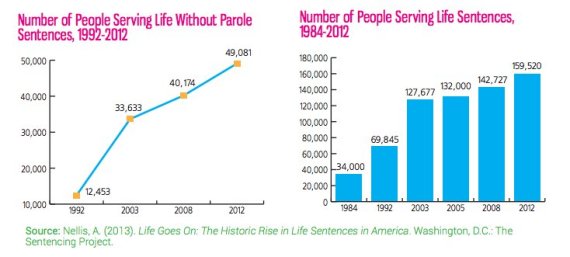
Source: The Sentencing Project 2013 report, "Life Goes On: The Historic Rise In Life Sentences In America."
Life behind bars was once reserved for the most dangerous murderers, for whom rehabilitation did not seem an option. With 159,520 behind bars for life as of 2012, we hand out such sentences with astonishing frequency, and for a wide range of crimes. In 2013,10,000 Americans were spending their lives in jail for non-violent crimes. Increasingly, these life sentences come without the possibility of being released on parole. For instance, Jeff Mizanskey is just one of many Americans serving life in prison without parole for non-violent drug crimes.
Jeff Mizanskey was sentenced to life-in-prison without the possibility of parole in 1993 under Missouri's "three-strikes" mandatory sentencing policy. All three of his convictions involved non-violent distribution of small amounts of marijuana. His son is petitioning the Missouri governor to grant his father clemency.
4. Currently, one-third of the world'sentire imprisoned female population is awaiting trial or serving sentences in the U.S., mostly for nonviolent crimes. Many are mothers.
4. Currently, one-third of the world'sentire imprisoned female population is awaiting trial or serving sentences in the U.S., mostly for nonviolent crimes. Many are mothers.
The rate of female incarceration is increasing at a rate nearly double that of male incarceration. Notably, 85-90 percent of female inmates have a history of domestic and sexual abuse, while nearly three-quarters of women in state prisons have mental health problems. These numbers are particularly disturbing when you consider what women face in prison: high rates of PTSD and adisproportionate rate of sexual assault, very often at the hands of prison staff.
Though the Prison Rape Elimination Act was passed more than a decade ago, only two states are currently in full compliance with the law, and anumber of GOP governors across the U.S. have actually fought federal efforts to combat this epidemic, which affects both male and female prisoners at high rates.
5. We lock up more juveniles than any other developed country.
5. We lock up more juveniles than any other developed country.
Of the youths under correctional supervision, 40 percent live in "correctional facilities" under prison-like conditions.
Research indicates that two-thirds of those juveniles suffer from mental health problems. According to anational survey from 2010, more than two-thirds suffer from substance abuse problems, while seven out of 10 had seen someone killed or severely injured and three out of 10 had attempted suicide. While locked up, many juveniles suffering from these conditions did not receive mental health counseling or substance abuse treatment. Meanwhile, 42 percent live in fear of being physically attacked and 30 percent reported being physically and/or sexually abused. Almost a third say solitary confinement is used as punishment at their facilities. Meanwhile, juvenile inmates lack the educational resources to get prepared for a normal life upon release.
6. And we're one of the only countries that treats some juvenile offenders like adults.
6. And we're one of the only countries that treats some juvenile offenders like adults.
An estimated 10,000 juveniles are housed in adult prisons and jails every day. Children of color are disproportionately incarcerated in these facilities. Juveniles held in adult confinement are twice as likely to be violently attacked in prison, more likely to commit suicide and more likely to commit future crimes once released.
Today, an estimated 2,570 Americans are serving life sentences for crimes committed as juveniles. These crimes are typically committed in group scenarios, often under the direction of an adult. Black juveniles were far more likely to be sentenced to life in prison. It's some consolation that a recent Supreme Court decision discouraged future life sentences for juveniles. That led to the resentencing of some juvenile offenders, such as Kenneth Young.
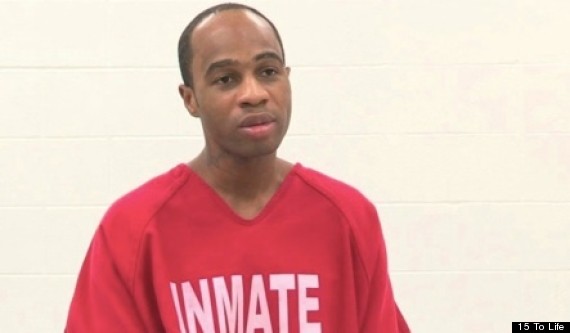
Kenneth Young was 14 years old when he committed four armed robberies along with his mother's 24-year-old drug dealer in Florida. He received four consecutive sentences of life in adult prison without parole; the 24-year-old received one life sentence without parole. A change in state law gave Young a chance at resentencing, after which his sentence was reduced to 30 years in prison. His story inspired a recently released documentary, 15 To Life.
7. Racism permeates the system: More than 60 percent of those imprisoned are people of color, though they constitute only 30 percent of the total U.S. population.
7. Racism permeates the system: More than 60 percent of those imprisoned are people of color, though they constitute only 30 percent of the total U.S. population.
To put that in perspective, there are currently more black men held within the criminal justice system (prison, jail, parole, probation) than were enslaved at the outbreak of the American Civil War. Much of this is a byproduct of racism in the war on drugs: Black Americans were nearly four times more likely to be arrested for possessing marijuana than white Americans -- even though white Americans were just as likely to use marijuana. Similar overall discrepancies occur for the youth population: Black youths are five times more likely to be incarcerated than white youths, while Latino and American Indian youths are two to three times more likely.
A 2003 Bureau of Justice report estimated that at current rates, black men born in 2001 have a 32.2 percent lifetime likelihood of incarceration -- in other words, one in three black men is likely to end up in prison. Meanwhile, some research indicated that black men serve between 14 and 20 percent longer prison terms than white men for the same crimes.

Source: "Imprisonment and Disenfranchisement of Disconnected Low-Income Men" from Race, Place, and Poverty: An Urban Ethnographers' Symposium on Low-Income Men, part of the Low-Income Working Families project.
8. These policies don't only affect those behind bars: One out of every 28 American children has a parent in prison or jail.
And two-thirds of those parents are incarcerated for nonviolent crimes. Though research on these children's experiences is scarce, it is clear that having a parent in prison often fractures their home life. (The most recent data shows that approximately half of parents in prison lived with their children before incarceration.) These children often come from at-risk backgrounds of poverty, and research suggests that parental incarceration elevates their risks of drug abuse, school failure, unemployment and mental health problems like depression.
These problems are only exacerbated by the financial stress put on families -- over half of parents incarcerated were the main financial providers for their children. Their families' incomes will continue to suffer even after their parents are released. Federal Judge Mark Bernett reflected on the way the system dooms many of these children to the same fate as their parents, in an interview with the Nation.
"I have seen how they leave hundreds of thousands of young children parentless and thousands of aging, infirm and dying parents childless," he said. "They destroy families and mightily fuel the cycle of poverty and addiction. In fact, I have been at this so long, I am now sentencing the grown children of people I long ago sent to prison."
9. Meanwhile, big corporations are making a killing off of the prison system.
As prison populations grew over time, much of that growth directly fed into privately run, for-profit prisons owned by corporations like the CCA or GEO Group. Between 1999 and 2010, the number of inmates in private prisons grew by 80 percent, while during the same period of time, overall prison populations only grew by 18 percent. As Matt Taibbi wrote in his book, "The Divide," “The big influx of cash impressed investors on Wall Street. Overall, the corrections industry is one of the soundest stock/equity bets in the world, with soaring revenues -- the industry as a whole pulled in more than $5 billion in America in 2011.” Indeed, GEO Group's CEO, George Zoley, has become the wealthiest correctional officer in America, raking in $22 million between 2008 and 2012.
10. This creates financial incentive to put people behind bars... and keep them there.
10. This creates financial incentive to put people behind bars... and keep them there.
Most private prison contracts mandate that the state or federal government keep 80 percent to 100 percent of prison beds occupied and institute fines for unused beds. These quotas create financial incentive to keep prisons filled; failure to do so means taxpayers pay the fine.
Private prisons also give lawmakers an easy way out. As Nicole Porter of The Sentencing Project told The Huffington Post, "Private prisons provide a safety valve to state and federal lawmakers dealing with prison overcrowding and prison population issues." Rather than dealing with overcrowded prisons by changing the laws that fill them with nonviolent inmates, lawmakers can funnel these inmates into readily available prison-beds-for-sale.
11. These companies have also discovered another goldmine: building facilities for the mass incarceration of undocumented immigrant detainees.
11. These companies have also discovered another goldmine: building facilities for the mass incarceration of undocumented immigrant detainees.
In recent years, the federal government's "Operation Streamline" policy offers "zero-tolerance" for undocumented immigrants. Under it, the number of non-citizens locked up in the U.S. has skyrocketed. Over 75 percent of those imprisoned have no criminal record.
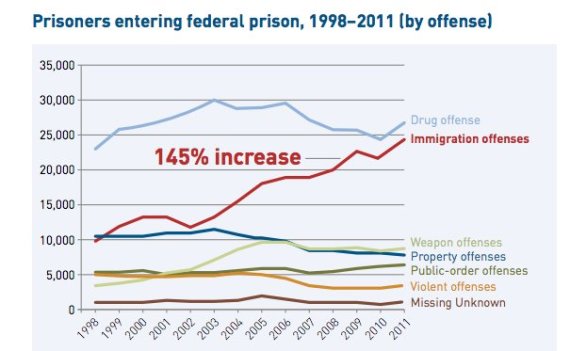
Source: ACLU Report: Warehoused And Forgotten: Immigrants Trapped in Our Shadow Private Prison System, 2014.
In 2009, more prisoners entered federal prisons for immigration violations than for violent offenses, weapon offenses and property offenses combined. Over half of non-citizen detainees, approximately 25,000 people, are living in privately owned facilities.
In private detention centers, detainees face physical abuse and mistreatment, including inadequate health care, threats of physical violence, overcrowding and conditions of squalor. There are sometimes arbitrary quotas for the solitary confinement units which are "reportedly kept so full that some people must sleep on the floor of a small cell they share with two strangers for 23 hours," according to the ACLU report. These facilities are geographically isolated, often far away from their families.
Many detainees lack the money to hire a lawyer and remain trapped in a seemingly endless legal process. As one detainee told the ACLU, "You lose your memory in this place. You keep counting days until you give up hope."
Meanwhile, private prison corporations found another way to profit off these people living in purgatory: They use detainees as cheap labor employing thousands to cook and clean the facilities. Some earn $1 a day; some earn candy bars, and some earn nothing. Last year, at least 60,000 detainees labored at these detention centers.
12. Private prisons try to cut costs by employing less-experienced staff and slashing prisoner resources.
12. Private prisons try to cut costs by employing less-experienced staff and slashing prisoner resources.
Porter said private prisons make cuts that "compromise public safety, ranging from lower rates of pay, to not investing resources toward training, to reducing programs and rehabilitation efforts for prisoners." As a result, private prisons can have an assault rate double that of what is seen at publicly run prisons. And these facilities disproportionately hold young Americans: Nearly 40 percent of incarcerated juveniles will serve their time in private facilities, which have been plagued by physical and sexual abuse.
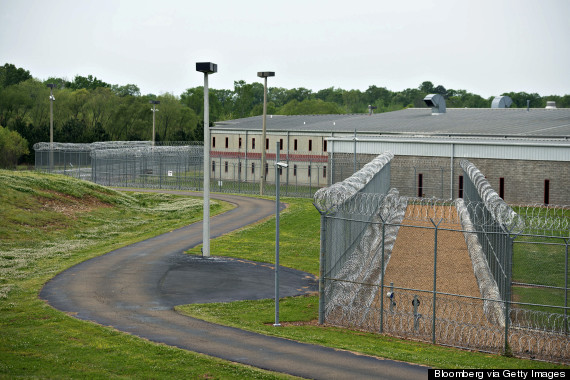
This is Walnut Grove Correctional Facility, a privately run juvenile detention center in Mississippi owned by GEO Group. A government investigation of the facility culminated in 2012, when a federal judge deemed it a "cesspool of unconstitutional and inhuman acts" withrampant physical and sexual abuse by the staff. Soon after, GEO Group shut down operations in Mississippi.
13. The system perpetuates a cycle of crime: More than two-thirds of people released from prison will be arrested again within three years.
13. The system perpetuates a cycle of crime: More than two-thirds of people released from prison will be arrested again within three years.
That's according to a study by the Bureau of Justice Statistics. Among juveniles released, 70 to 80 percent will be arrested again within two to three years, according to a number of state studies. Contrary to what"tough on crime" politicians of the 80s and 90s once told voters, prison does not reduce crime and may actually produce future criminals.
While crime rates have declined over the past decades, don't thank our prison obsession. When Harvard Professor Bruce Western studied the decline in crime from 1993-2001, he found that just one-tenth of the decline was due to rising prison populations. The rest, he says, stemmed from factors like increased local police force presence.

14. It's become increasingly clear that we're more focused on locking people up than actually rehabilitatingthem.
As the Women's Prison Association President Georgia Lerner told the Guardian, this stigma lasts a lifetime. "We lock people up, strip them of all authority over themselves, disempower them in a very real way –- and then expect them to be able to function in the community after they are released," she said. "It simply doesn't work. Prisons were designed to confine people and keep them alive, and not much else."
Indeed, while more Americans are spending more time in prison, many lack access to drug education programs and mental health programs, both of which could help address the problems that got them locked up in the first place. And while a U.S. Department of Justice/RAND corporation joint study found that inmates given educational opportunities are 43 percent less likely to commit a future crime, only six percent of inmates were actuallyenrolled in such programs. Inmates with inadequate education face a daunting challenge of finding employment upon release, a challenge substantially magnified by the stigma of having a criminal record. It's not surprising, then, that former inmates face rampant unemployment and lower wages.
But released inmates face more than just the new financial burdens of the real world: Many leave prison with overwhelming debt due to legal fees. Though rules vary depending on the state, inmates can be charged for everything from court costs to public defender reimbursements, in-prison electricity bills, in-prison telephone bills, drug testing and parole supervision. In Texas, the average cost of being released on parole ranges from $500 to $2,000. Sometimes, the "crime" of not being able to pay off that debt lands former inmates back behind bars.
But Alabama, Georgia, and other Southern states have found a disturbing way to expedite that process: They allow former inmates to literally pay off their debt by spending more time in prison.
As the incomparable Stephen Colbert summed up this outrageous system in a recent segment, "Some may say that jailing people over their debts makes poverty into a crime. Well if that's true, maybe we should just cut out the middle man and put all poor people in jail. Of course, this will require new prison facilities, which we can build using people who can't pay their prison fees. Not as workers, as the bricks."













